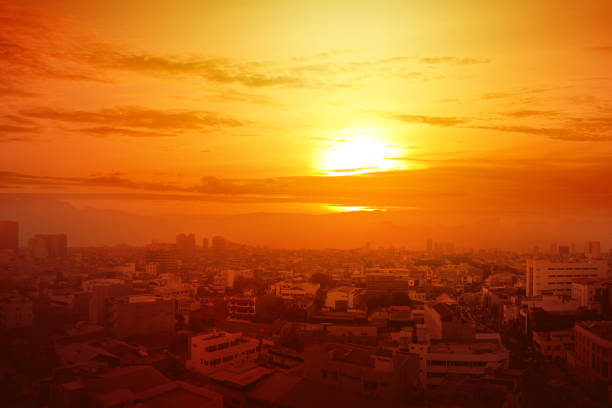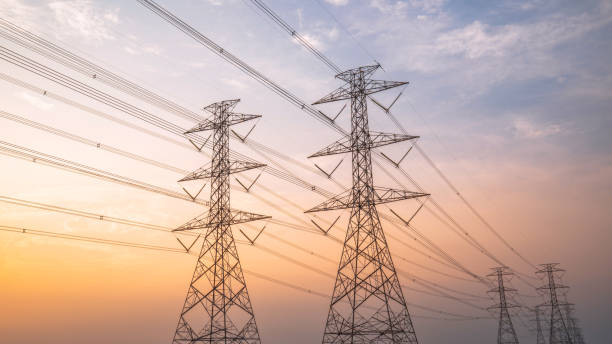South and South-East Asia are being scorched by a record-breaking heatwave with temperatures reaching up to 45 degrees Celsius, necessitating the need for cooling measures.
People are using their air conditioners and electric fans to escape the heat, which has not been experienced in decades. Farmers are battling with poor crops, and power systems are having a hard time keeping up.
The worst is yet to come, according to climatologists, since the El Nino weather phenomena is projected to make this prolonged dry spell even worse.
The heat is more than simply an inconvenience, with deaths from heatstroke occurring in India and pupils being hospitalised due to classroom heat. Vulnerable populations are more vulnerable, and the spike in electricity consumption is putting a strain on impoverished countries like Bangladesh, where millions of people are without power.
According to climate policy expert Dr. Fahad Saeed, this year’s record heat represents a clear climate pattern that will bring public health concerns for years to come.
Record Heatwave of up to 45 degrees C Scorches Much of Asia

Image source: iStock
South and South-East Asia are currently experiencing a record-breaking heatwave. Temperatures as high as 45 degrees Celsius have been recorded in India, Thailand, and Myanmar, and 42 to 43 degrees Celsius in Bangladesh, Laos, Vietnam, Nepal, and China. Temperatures like these haven’t been seen in most of these countries in decades.
This heatwave has been dubbed the “worst April heatwave” in the continent’s history by climatologist and weather historian Maximiliano Herrera. Unfortunately, experts believe the worst is yet to come.
Deaths and Melting Asphalt
The extreme heat has been more than simply a nuisance. At least 13 persons died from heatstroke after attending a state award ceremony attended by over a million people in India’s western Maharashtra state.
The air in Ahmedabad, the state capital of Gujarat, had been so hot and humid that asphalt on a freshly built road melted rather than hardened. As the temperature reached above 40 degrees Celsius this week, at least two more Indian states ordered school closures. Heatstroke is causing students to be hospitalised, and the consequences for vulnerable communities are likely to be devastating.
Struggling Power Grids

Image source: iStock
Power systems are struggling to keep up with the rise in power demand as people seek relief from their air conditioners and electric fans. Bangladesh, a poorer country, is forced to turn off power to millions of people. India has issued a blackout warning as increased use of air conditioners and irrigation pumps depletes the fuel used by its power facilities.
Climate Change and Public Health
Scientists are not amused by the heat. They claim that human-caused warming is causing heatwaves to persist longer and be more intense. Dr. Fahad Saeed, a climate policy expert, says that this year’s record heat represents a clear climate pattern that will pose public health challenges for years to come.
The high heat will disproportionately affect the poor, and it may even be fatal for those without access to conditioning or proper shelter.
Final Thoughts
Asia is witnessing a record-breaking heatwave that is putting communities at risk. With electricity grids overloaded, farmers facing failing harvests, and people seeking refuge in shopping malls and offices, it is evident that this heat is more than simply an annoyance.
The consequences for vulnerable populations could be fatal. Climate experts warn that this year’s heat represents a clear trend caused by human-caused warming, and that it will pose public health issues for years to come.
ALSO READ:
Heat Stroke: Signs, Causes and How to Avoid It in Singapore
Hot Weather Can Be Linked To Poor Pregnancy Results: Research
Parent’s Guide To Fever And Heat-related Illnesses In Children During Hot Weather
 Together Against RSV
Together Against RSV SG60
SG60 Pregnancy
Pregnancy Parenting
Parenting Child
Child Feeding & Nutrition
Feeding & Nutrition Education
Education Lifestyle
Lifestyle Events
Events Holiday Hub
Holiday Hub Aptamil
Aptamil TAP Recommends
TAP Recommends Shopping
Shopping Press Releases
Press Releases Project Sidekicks
Project Sidekicks Community
Community Advertise With Us
Advertise With Us Contact Us
Contact Us VIP
VIP Rewards
Rewards VIP Parents
VIP Parents
